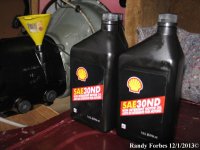Offline
Well go ahead and load up your weapons, the bullseye is right on my head.  I decide to start another post because I didn't want to hi-jack tomnanny's thread about an oil leak. But I had been following the discussion with great interest and finally I must ask this question. I have always found it intriging that in researching the topic of oils for our Transmissions and Overdrives, I always end up at the Shop Manual or the "Austin Healey 3000..Driver's Handbook". Neither of these contradict each other so I will stick with the 'Driver's Handbook' for simplicity. In the handbook, on page 63, in the list of recommended lubricants, it list at least (3) "Multigrade" oils for use in the Engine/trans/carbs. I have never heard of a "Multigrade Detergent Oil". So if the DHM company was recommending Multigrade oils, then they were by inferance at least allowing a non-detergent oil in their transmissions. The argument about GL4 & GL5 oils is not relevant to the discussion of detergent vice non-detergent because GL5 does not denote detergent. But I do understand the differences between GL4 & GL5 and that the GL5 is for the higher pressure applications such as rear end gears. Dave.
I decide to start another post because I didn't want to hi-jack tomnanny's thread about an oil leak. But I had been following the discussion with great interest and finally I must ask this question. I have always found it intriging that in researching the topic of oils for our Transmissions and Overdrives, I always end up at the Shop Manual or the "Austin Healey 3000..Driver's Handbook". Neither of these contradict each other so I will stick with the 'Driver's Handbook' for simplicity. In the handbook, on page 63, in the list of recommended lubricants, it list at least (3) "Multigrade" oils for use in the Engine/trans/carbs. I have never heard of a "Multigrade Detergent Oil". So if the DHM company was recommending Multigrade oils, then they were by inferance at least allowing a non-detergent oil in their transmissions. The argument about GL4 & GL5 oils is not relevant to the discussion of detergent vice non-detergent because GL5 does not denote detergent. But I do understand the differences between GL4 & GL5 and that the GL5 is for the higher pressure applications such as rear end gears. Dave.

 Hi Guest!
Hi Guest!

 smilie in place of the real @
smilie in place of the real @
 Pretty Please - add it to our Events forum(s) and add to the calendar! >>
Pretty Please - add it to our Events forum(s) and add to the calendar! >> 

